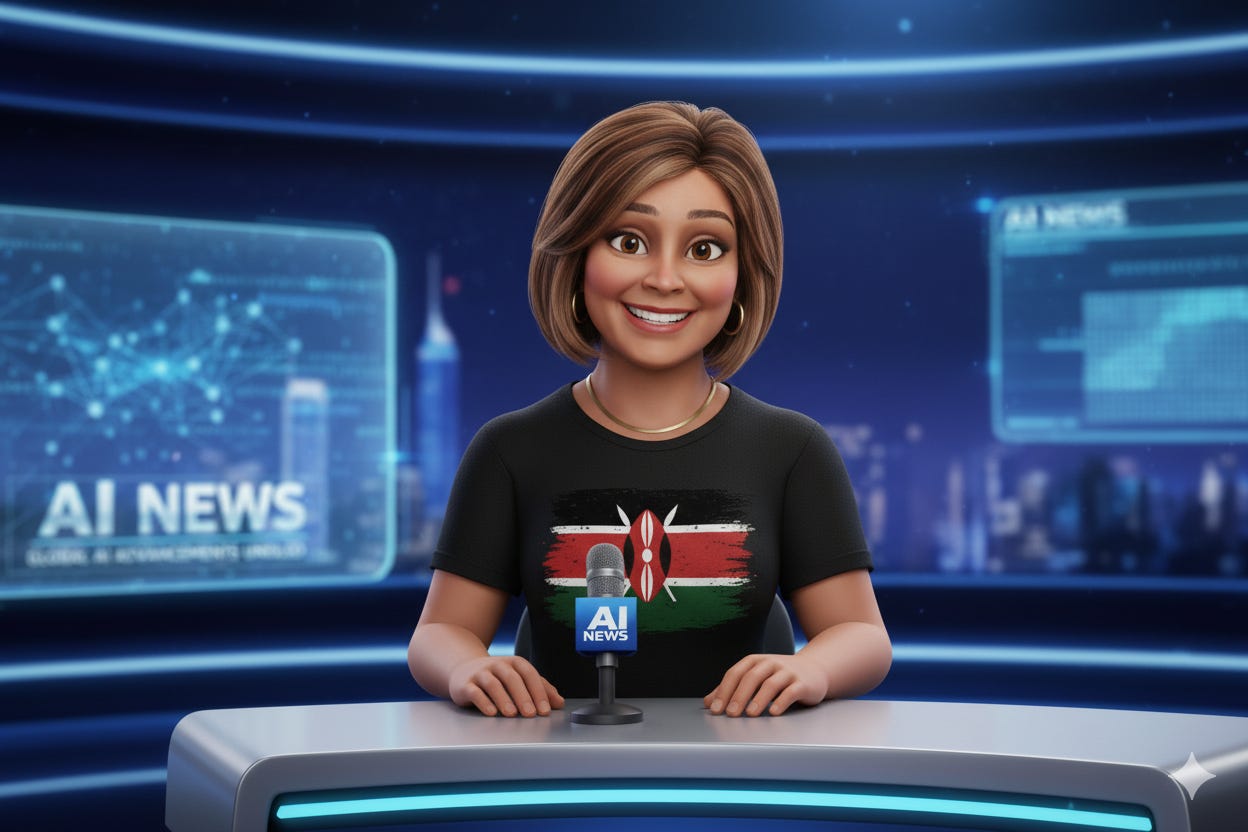Africa's AI Reality Check: Where We Stand, What's Blocking Us, and Why It Matters
Highlights from good research by Cisco and Carnegie Mellon University Africa. Plus my new anchor look. Vote!
Hello.
We are thinking of creating a AI news series using video with Avatar Zain (no hair and make up to do, exciting …) I spent some time trying out a few host shots to see what could be best to deliver news, info, and offer my perspectives occasionally.
Here was one idea that no one on my team liked except for me.
Here was another we all kind of liked:
What do you think?
Anyone here want to sponsor this bulletin?
You can see where I landed below. I also tell you how I did it
Africa's AI Reality Check
Cisco and Carnegie Mellon University Africa (CMU-Africa) teamed up and wrote "AI and the Workforce in Africa: Realizing the Region's Potential Through Public and Private Sector Collaboration.
We give you the highlights. You can read the full whitepaper here.
Breaking down the continent's artificial intelligence readiness from a 2.5% market share to a $2.9 trillion opportunity
Africa accounts for just 2.5% of the global AI market, valued at $16.5 trillion in 2024. We contribute less than 5% to global AI research outputs and grants.
Yet in 2024, more than half of the world's new national AI strategies came from lower-middle and low-income countries including Ethiopia, Zambia, and Nigeria.
The African Union released its continental AI strategy in July, aiming to "harness AI for Africa's development and prosperity."
Where African Countries Stand Right Now
This white paper uses Oxford Insights Government AI Readiness Index and IMF's AI Preparedness Index to measure over 40 indicators across government readiness, technology sector maturity, and data infrastructure. Here's who's leading and why:
The Front-Runners (My home country is not at the top, weh!)
Mauritius: Consistently ranks as Africa's most AI-ready nation. They've leveraged their existing digital economy infrastructure to build AI applications specifically for their tourism and financial services sectors, rather than trying to compete across all fronts.
Rwanda: Has established the Centre for the Fourth Industrial Revolution (C4IR) in Kigali and hosted the 2025 Global AI Summit on Africa. This represents a governance-led approach where the government actively drives AI innovation through policy and partnerships.
Egypt: Benefits from scale with a large population and established tech ecosystem. Has launched a National AI Strategy and leverages its educational institutions to build AI capacity.
South Africa: Possesses the most mature tech infrastructure on the continent, accounting for nearly half of Africa's data center capacity. However, even here only 18% of organizations are fully prepared to deploy AI technologies according to Cisco data.
Ghana: Hosts the Google AI Lab in Accra and has developed strong public-private collaborations spanning education, agriculture, and service delivery. Shows how strategic partnerships can accelerate AI development even without massive infrastructure.
Kenya: Launched its National AI Strategy 2025-2030 in March 2025. Known as the "Silicon Savannah," Kenya's tech ecosystem includes major investments from Microsoft and hosts innovation hubs like iHub which has spawned over a hundred successful startups.
So what sets these countries apart? It isn't just adoption of AI tools.
They combine strategic vision with R&D ecosystems
Digital skills development
Robust data systems.
We want to develop AI, not just be the consumers.
The Six Major Problems
Connectivity Crisis
62% of Africa's population (approximately 860 million people) remain offline
While mobile coverage is expanding, actual internet access remains limited, particularly in rural areas
Without basic connectivity, participating in the digital economy becomes impossible
Data Center Shortage
Africa's total data center power capacity is just over 400 megawatts for 1.4 billion people. South Africa alone accounts for nearly half of this capacity
The region needs an estimated 1,000 MW and 700+ additional data center facilities in the coming decade
This infrastructure gap limits our ability to process and store data locally
Language Exclusion
Only 0.02% of internet content exists in African languages
This means AI models trained on internet data literally cannot understand how most Africans communicate
Entire communities remain invisible to AI systems because their languages, stories, and knowledge aren't represented in training data
Minimal Research Investment
Most African countries allocate less than 0.5% of GDP to research and development
Africa's entire AI talent base is estimated at just 5,000 professionals (though it grew by 40% in 2023)
This limits our ability to generate homegrown AI innovations and adapt technology to local contexts
Brain Drain
An estimated 70,000 skilled professionals leave the continent annually
Lack of adequate infrastructure, research funding, and career opportunities drives this exodus
This creates a vicious cycle where talent leaves, making it harder to build the ecosystem that would retain future talent
Implementation Gaps
Even in South Africa, only 18% of organizations are fully prepared to deploy and leverage AI-powered technologies
Legal and governance frameworks remain underdeveloped
The gap between having AI strategies and actually implementing them remains vast
The Economic Opportunity
OK. Interlude. What do you think. It’s not perfect. It’s a bit swollen mouth weird. But this was created from a single photo.
I used Gemini’s NanobananaI uploaded my old CNN head shotThen i added my teeshirtThen I changed the scenarioTweaked it a littleAfter that I used HeyGen to upload the photoI recorded a little scriptExported thisLOL
Where AI Will Have Maximum Impact:
Agriculture - The sector employing most Africans
Precision farming: Using satellite data and weather patterns to optimize planting schedules, irrigation, and fertilizer use
Advisory tools: Mobile apps allowing farmers to photograph crop diseases and receive treatment recommendations
Market intelligence: Real-time price information helping farmers decide when and where to sell
Financial Services - Critical for economic inclusion
Alternative credit scoring: Using mobile money transaction history and bill payment patterns to assess creditworthiness
Fraud prevention: Real-time detection of suspicious transactions protecting both institutions and customers
Mobile money efficiency: Optimizing cash distribution networks and predicting agent liquidity needs
Healthcare - Addressing severe specialist shortages
Rural diagnostics: AI tools helping nurses and community health workers diagnose conditions without specialist doctors
Telemedicine enhancement: Platforms that triage patients and facilitate remote consultations
Supply chain management: Predicting medicine demand and preventing stockouts at clinics
Consumer Industries - Growing rapidly with urbanization
E-commerce infrastructure: From recommendation engines to last-mile delivery optimization
Inventory management: Predicting demand based on local factors to reduce waste
Customer engagement: Personalized marketing and customer service in local languages
Africa's Unique Advantages
Nano Banana, Gemini
Demographic Dividend Africa's median age is 19.3 years, compared to 38.4 in the US and 48.4 in Japan. By 2030, Africans will account for 42% of the world's youth, with 75% of the continent's population under 35. This young population is digitally native, adaptable to new technologies, and entering the workforce as AI transforms it.
Digital Engagement Despite infrastructure challenges, 78% of African youth report using AI tools weekly, higher than rates in Europe or the United States. 75% of African youth plan to start a business in the next five years, and nearly 80% of new startups are digital-first. This shows remarkable entrepreneurial energy and willingness to adopt new technologies.
3. Women's Entrepreneurship African women are twice as likely to be new business owners compared to the global average. This represents a massive opportunity for inclusive AI development if we ensure training and infrastructure are accessible to all. Women-led businesses could drive AI adoption in sectors like agriculture and retail where they're strongly represented.
What Needs to Happen
Infrastructure Requirements:
Expand internet access beyond the current 38% penetration rate through both mobile and fixed broadband. Build 700+ new data centers with combined 1,000 MW capacity to enable local data processing
Upgrade national electricity grids and broadband infrastructure to support digital economy growth.
Ensure rural areas aren't left behind through innovative connectivity solutions
Policy and Governance:
Move from writing AI strategies to actually implementing them with clear timelines and accountability
Strengthen data protection frameworks through the Network of African Data Protection Authorities (NADPA)
Create incentives for diaspora return: tax breaks, visa facilitation for families, and recognition of foreign qualifications
Harmonize regulations across countries to enable cross-border digital trade and data flows
Skills and Talent Development:
Scale AI professionals to meet growing demand through targeted training programs. We currently only have about 5000 for the whole continent! Integrate AI literacy into education systems from primary school through university
Develop task-specific training for entrepreneurs - focus on using AI tools, not just understanding theory
Ensure women and rural populations have equal access to AI training opportunities
Investment Priorities:
Increase national R&D spending above the current 0.5% of GDP average
Direct funding to sector-specific AI applications solving local problems rather than generic solutions
Invest in creating datasets in African languages to ensure AI systems can serve local populations
Establish dedicated venture funds for AI startups with patient capital understanding the technology's development timeline
The Bottom Line
Success won't come from trying to compete with Silicon Valley on large language models. Instead, it's about targeted applications solving distinctly African challenges: agricultural advisory systems for smallholder farmers, financial inclusion tools for the unbanked, healthcare diagnostics for underserved communities.
Please Subscribe!
Next: We’ll be breaking down African AI Jobs of the Future from this same report and examining which roles will emerge, what skills matter most, and how to prepare a workforce for jobs that don't exist yet - you don't want to miss it!




